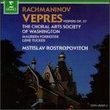| All Artists: Mahler, Bernstein, Vpo Title: Symphonies 8 & 10 " Adagio " Members Wishing: 1 Total Copies: 0 Label: Polygram Records Release Date: 10/11/1991 Genre: Classical Style: Symphonies Number of Discs: 2 SwapaCD Credits: 2 UPC: 028943510226 |
Search - Mahler, Bernstein, Vpo :: Symphonies 8 & 10 " Adagio "
CD DetailsSimilar CDs
Similarly Requested CDs
|
CD ReviewsI'm the first to review the VPO version? Michael | Wisconsin, USA | 11/07/2007 (5 out of 5 stars) "I've lived with the London SO/ Bernstein performance of the "1000" Symphony since 1962, and though it contains some astounding playing and singing I've never quite been satisfied with it. I suspect that Lennie wasn't that satisfeid with it either, if comparisons with this later VPO performance is any indication.
(1) The notorious slow-down at the beginning of the recapitulation of Mvt. 1 in the LSO version is justly notorious, because it doesn't work to do what apparently Bernstein intended it to do. Looking at the score leads one to think that Mahler was determined to take the hell-bent tempos of the incredible development section riding straight and undiminished into the recap as its triumphant climax, with a slow-down coming shortly after. Bernstein keeps the deliberate thwarting of Mahler's indications in the VPO, but this time it works. What you get is a frantic run-up to the end of the development section--which has been taken at break-neck speed--with the recap coming as a sudden relaxation of tension. I will say that it worked for me, and Bernstein convinced me that the music can justifiably be played that way. (2) The song-cycle 2nd movement is taken with on balance with an intensity that I'm not use to--certainly more passionate that the same movement done in London. I will say that Solti's way with the mysterious pizzicati at the beginning of the movement has no parallel here or anywhere else either, to my knowledge. (Parenthetically the children's chorus is stellar--heroic kinder if there ever were such). Too often, conductors tend to make the 1st movement the whole work's center of gravity, leaving the episodes of the 2nd to unfold leisurely. Bernstein understands that the 2nd mvt is Mahler's replay of the 4th symphony--with this time a marvelous and marvelously incongruent mix of Goethe's tortured Part 2 of Faust, and a child's vision of heaven. I personally suspect that the spiritual model for Mahler's "plotting" here is Wagner's "Parsifal," which a recent director of the opera at Beyreuth--Boulez conducting--said ends with a near-death exeperience: a vision of a heaven of life, light, and joy. In any case, this version for me goes up to the top of the list along with Solti's version, and the now legendary Eduard Flipse 1950s Holland Festival performance, recently put on CD as I recall." |







![Harry Potter and the Prisoner of Azkaban [Original Motion Picture Soundtrack]](https://nationalbookswap.com/cd//m/28/9428/689428.jpg)





